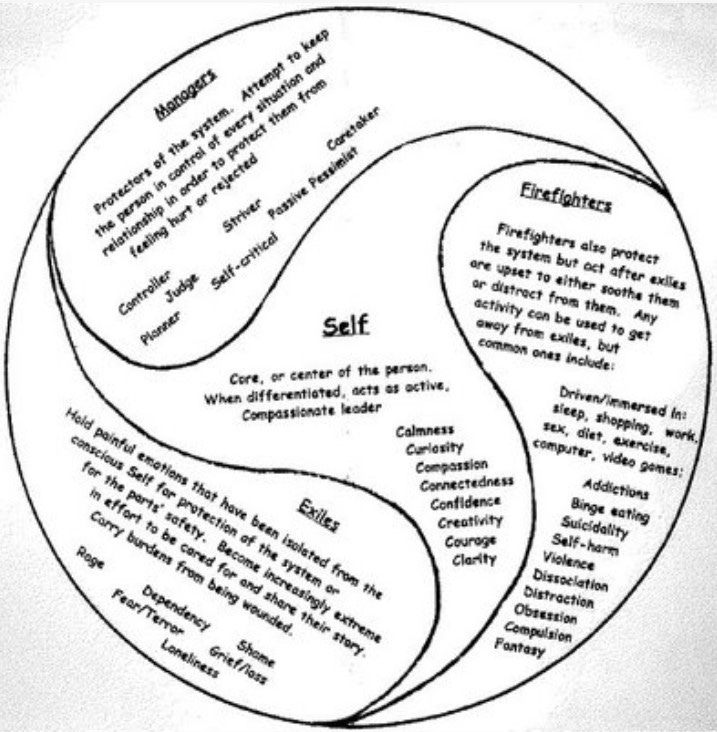IFS History in a Nutshell
Internal Family Systems (IFS) was developed in the 1990’s by Richard Schwartz in response to working with a client who was struggling with Bulimia Nervosa. During sessions, Schwartz was struck by his client’s frequent references to their “eating disorder voice.” He noticed that it seemed as if the eating disorder was personified with its own distinct personality traits. At the time, Schwartz was well-trained in family therapy and Systems Theory, an approach that looks at how elements relate to each other as well as to a larger whole while positing that when you make a change in one part of the system, all parts of the system are affected and therefore changed.
According to IFS, every individual has different “parts” that make up their self “system.” Multiplicity of the mind is neither new nor revolutionary. Singlets have long used parts language to describe their experiences. For example, part of me wants to go out while part of me wants to climb into bed and read a book. Schwartz realized that by conceptualizing internal “parts” of self, each with their own personality traits, he could essentially conduct family therapy internally with his clients and their internal parts of self. In other words, he could apply his training in family therapy and informed by Systems Theory to help his client navigate their internal world differently.
By looking at relationships between parts of self, how they interact with each other and work to ultimately protect the individual, Schwartz posits that the relationships and behaviors can be changed so that the individual heals.
The Structure of IFS
IFS says that each person is made up of a series of parts, each with its own unique perception of the world and defining characteristics, fears, beliefs, burdens, and history. The end goal is always stability and safety of the internal “system” of parts.
The IFS model assumes that everyone has a Self with a capital “S,” that is defined and identifiable by what is known as the 8 C’s: curiosity, confidence, clarity, compassion, creativity, connectedness, calm and courage. IFS believes that this wise, compassionate Self is highly capable of leading the person’s internal system, and keeping the system stable, safe and thriving. The problem, however; is that the Self is often unseated from its position of control by anxious Protectors who fear annihilation of the system itself.
Let’s pause for a moment to define the internal parts as IFS sees them. According to IFS every person has the following parts which make up the system:
Managers maintain day to day functioning by keeping the person on track and focused. Managers do this by ensuring that uncomfortable feelings and/or challenging interactions and experiences are avoided. Managers are careful to dodge any potential triggers that might be in the environment. Managers are one type of Protector.
Firefighters fear that being in touch with deep pain and unhealed wounds will annihilate the person and their internal system. To prevent this annihilation, firefighters work hard to distract from pain. To accomplish this feat, firefighters employ impulsive behaviors that are addictive, abusive, difficult to ignore or even flamboyant in nature. Things like workaholism, eating disorders, self-harm, and substance misuse are common firefighter behaviors. Firefighters are the second type of Protector.
Exiles are the trauma holders. They hold significant pain and unhealed wounds that most often stem from childhood. Managers and firefighters “exile” these parts (hence their name) to stop them from coming into the person’s conscious awareness. The fear is that if the exiles were to come into conscious awareness, the person would be so overwhelmed by the emotional agony and memories that the entire system would topple, rendering the person completely unable to function.
It is crucial to underscore the fact that in IFS, there are no bad parts. In fact, that is the title of Schwartz’s latest book. By recognizing that all parts are essentially benevolent, albeit perhaps misguided in their technique, the theory itself is entirely non-pathologizing. For this reason alone, IFS attracts many people: clinicians and clients alike.
The IFS Understanding of the Self
The IFS Self is the omniscient, wise, overarching part that observes the inner world, experiencing life as the “I.” IFS works to separate the Self from the Protectors and Exiles that comprise the person’s inner system. Ideally, IFS seeks to “unburden” the exiles from the pain they hold, which in turn frees the Managers and Firefighters to take on new, updated roles that will ultimately allow the entire internal system to work together in harmony, guided by the wise, ever compassionate Self.
The actual process of IFS therapy necessitates that the therapist guide the client into the state of the Self. The present, wise Self always knows what needs to be said to each and every manager, firefighter and exile in order to eventually achieve a harmonious system. In short, IFS therapists teach clients to get into the Self state to be their own good parents or therapists to their own internal family system. Eventually, the client becomes adept at assuming the Self state, recognizing various parts and facilitating internal conversations, understanding and cooperation.
What’s All the Excitement About?
To say that that many therapists are excited about IFS is like saying the ocean is a little bit wet. It’s a major understatement. In fact, IFS therapists have been called everything from Groupies to cult-like.
What are they so excited about? Well, therapists relish the fact that IFS doesn’t retraumatize clients, nor does it ‘encourage’ or create dependence on the therapist. Instead, it promotes independence by teaching clients to directly recognize, talk and negotiate with, and ultimately parent and love their parts. When a client is in the “Self state” visualizing and speaking to another internal part, they naturally create emotional distance from the primary emotions associated with the situation at hand. When using IFS, clients are not typically overwhelmed or triggered. Instead, clients are able to navigate emotional content that might otherwise be incapacitating.
IFS also has a specific process to “unburden” exiles. The client, in the Self state, assumes a very active role in the unburdening process that frees the exile from pain, wounds, shame and other feelings or beliefs that prevent the individual from thriving in life. Following the release of these burdens, parts identify qualities and characteristics that they need. The parts will assume and integrate those qualities and characteristics thus filling the empty space left as a result of the unburdening process. These qualities could be things like confidence, self-esteem, compassion, bravery or any number of characteristics that help people more confidently navigate life and the world at large. Many people credit the gentle IFS process with finally healing deep-seated, lifelong wounds and radically changing their lives for the better.
What’s Not To Love? Well…A Couple of Things
IFS has come under some recent fire. Initially, one needed to be a trained therapist to become certified in IFS, which, incidentally, happens to also be a substantial financial investment. That makes sense, right? A therapist getting certified in a particular type of therapy makes sense. But, now, it turns out that you can also not be a therapist and still become an IFS Certified Practitioner.
Wait…WHAT?!
A Certified IFS Practitioner is a person who “is registered or certified in their own field of practice. Professional scope of practice is determined by the individual’s professional background prior to IFS certification.” According to the IFS official website
IFS is much more than a non-pathologizing evidence-based psychotherapy to be used in a clinical setting. It is also a way of understanding personal and intimate relationships and stepping into life with the 8 Cs: confidence, calm, compassion, courage, creativity, clarity, curiosity, and connectedness. Professionals from many different backgrounds such as, but not limited to, legal mediation, school administration, life coaches and religious leaders may utilize IFS to inform and guide their work. Our growing list of educational programs aims to serve not only therapists but the wider public and other professions.
So, IFS Certified Practitioners can be dietitians, medical doctors, coaches, yoga instructors…where does it stop? We don’t know. What we do know is that, while it is fine for IFS to inform anyone in their life and work, there are clients who have sought to do bona fide trauma work from dietitians and coaches who are IFS Certified Practitioners. Is that safe? We don’t think so. Is it regulated? It doesn’t seem to be. But IFS certifies them just the same, and some of these folks in these “other professions” are attempting to do trauma work. We have listened to several reports of clients who have been harmed by this phenomenon, and that, all by itself, is wildly concerning and feels highly unethical.
IMPORTANT: If you are seeking IFS therapy to work on trauma or sensitive emotional issues, please ensure that you are seeing an IFS Certified Therapist and not practitioners from various and sundry other professions to ensure that you can be as safe as possible.
But What About IFS for DID/OSDD and other Dissociative Disorders??
IFS for dissociation is convoluted for a variety of reasons, As it turns out, many in the plural community just plain old don’t like it. And for some really good reasons. Let’s unpack:
Popularizing & Conflating Terminology- IFS has brought parts language into the mainstream. They profess that ‘everybody has parts.’ To be sure everyone has ego states. Ego states are basically adaptations to various life circumstances, interactions, and relationships. How you behave and feel at work is different from how you behave and feel at your parents’ home is different from how you behave in your own home is different from how you behave and feel at the gym is different from how you behave and feel on vacation. You get the idea. However, ego states are not at all the same as the well-defined, compartmentalized parts that people with complex dissociative disorders or dissociative identities experience. Not by a long shot.
Furthermore, the concept that “part of me wants to go to a movie” while “another part of me wants to stay home” might well be the ubiquitous experience of singlets, but it is nowhere near the experiences of people with complex dissociation. Many people confuse Exiles and Inner child work. Inner child work is far from a new concept, but it is one that has gotten a lot of traction recently. The experience of the inner child is markedly different from the degrees of separation and amnestic barriers between the parts of self in DID/OSDD systems. Many people in the plural community feel that saying that “everyone has parts” profoundly minimizes their experiences. We agree. It is absolutely not the same thing.
IFS has mainstreamed multiplicity of mind talk to such a degree that many people who don’t have DID/OSDD think that they do, and people who do actually have it think that they don’t. This isn’t helpful to anyone.
Multiple Selves- IFS identifies a singular self. That one, wise, compassionate seat of consciousness Self that singlets almost immediately recognize and identify with. “Ah yes, that part of me!” While some systems might identify an omniscient wise part or alter as their overarching “Self,” most DID/OSDD systems will tell you that they have more than one Self. We have a 23-year-old part, for example, who has her own firefighters, managers, and Self,…and so do “I,” the part that is writing this right now in this moment. In fact, so do many of our parts. IFS on its own, does not have a particularly good solution for this conundrum. A therapist insisting that a DID/OSDD system keep searching until they identify and are in their one singular “Self” that doesn’t exist is frustrating, isolating and arguably harmful. It invalidates the experiences of those with dissociative identities.
We mentioned this enigma to our own therapist, who happens to be a Level 3 IFS Certified Therapist. Looking initially perplexed, she clarified that the “Self” in her mind, is really “a self in the spiritual sense,” like a higher self or oversoul. We’ve been told, and have witnessed in our own training with him years ago, that Dick Schwartz is a pretty spiritual guy, so that explanation made sense to us. But this is also problematic. Not everyone subscribes to that spiritual belief system— never mind those who have experienced religious abuse— as such, those who do not identify with these beliefs will find that IFS can fall far short in helping someone move forward particularly if the therapist remains wedded to moving the client into the “Self state.”
Translating and Internal Communication-IFS interventions ask people to get into their Self state and invite parts forward to get to know each other, exchange information and negotiate. By doing this, parts can unburden themselves, heal and update their perspectives, skills and roles. If you were to watch or participate in a session, you might see the therapist serving as a kind of coach, asking the client questions like, “How do you feel toward that part?” “What does that part look like?” “How close are you to the part?” “Ask that part if you can move a little closer to it. ” “Ask that part if there is anything that it wants you to know.” While these are great questions for singlets, this process can be highly problematic, if not impossible, for many people whose internal communication between parts is not yet in place or where the amnestic barriers between parts are high.
Asking a client to relay to the therapist what parts say, when the client may not have good or any control over who is fronting adds yet another layer of difficulty to this process. Many systems cannot control who is fronting, who is exerting passive influence or who comes out when. Although many systems are adept at masking, being able to “present as” one part is not at all the same as being that one part. This only adds to an already thick sense of confusion and becomes outright unwieldy. If the “rule” is that parts are not supposed to come out, but rather “talk through” the host, this creates problems. Not wanting to break rules or get in trouble, but having something really important to say, leaves parts stuck or frozen. If a part does “break the rules” and come out, it can lead to shame and ultimately exacerbate internal conflict. These are just a few examples of problems that can arise for systems in therapy that uses the IFS model.
But Is There Any Benefit?
There can be! Some therapists who work with dissociative disorders say that IFS techniques can work well as long as they relinquish the belief that there is one singular Self AND they are also willing to talk directly to the parts, while allowing parts to come out as needed to communicate. Making that clear at the outset is vitally important.
Receiving mixed messages will only create confusion. If a therapist says, “I’m here and want to talk to all the parts” and perhaps even underscores that from time to time with statements that lead with, “I just want to say to all of the parts…” but at another point states something like, “It’s better if you can watch it on a screen and tell me what they say.” or “It’s better if they can talk through you, rather than coming out themselves,” the client and all of their parts are going to get stuck. "Is it okay to speak directly to the therapist as they suggested or are we supposed to stay hidden inside?” Is it okay to come out? It should be. This needs to be clarified so the therapy and healing can progress. Dissociation has been a lifeline that secured survival. It needs to be respected and understood through a lens of compassionate curiosity.
To Try or Not to Try: That is the Question
At the end of the day, the only thing that matters is what works for you and your system. Trying IFS is very reasonable and it has helped plenty of systems. Its respectful, non-pathologizing lens can feel empowering and can assist internal communication over time. Our hope is that in laying out some of these issues, if you do want to try it, you will know how to clarify expectations upfront and avoid some of the pitfalls that are unique to systems. The only thing that really matters is your healing, however you define that for you(s).








Thank you so much!
We had not heard that he was trying to copyright ‘parts’ and ‘systems’-- honestly it’s absurd that he wants to given that, as you point out, that language has long predated his arrival on the therapeutic scene. It’s infuriating whenever someone usurps something that belongs to a collective and attempts to place it out of reach or regulate it in ways that feel inaccurate and inauthentic for groups of people- especially groups of marginalized people. This is worth fighting back on in our opinion.
This!!!!
As a therapist and a DID System I have been very conflicted about Dick Schwartz and IFS. Also did you hear that he is attempting to copyright lingo he uses in IFS such as "Parts" and "Systems"? Because when I heard this I was FUMING!! Our community have used these terms long before he ever popularized IFS, and to put a community created term behind a pay wall is deplorable!!
Very well written article. Thank you 🙏